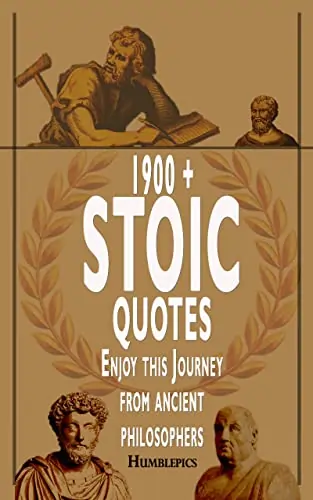Stoicism
A practical toolkit for thriving in chaos.
1. Control
1“The chief task in life is simply this: to identify and separate matters…” — Epictetus
Divide the world into two: Things you cannot control and the one thing you can (your mind).
The Morning Filter: List 3 expected events. Label them “Control” or “No Control.” Focus only on your response.
2. Preparation
2“Unexpectedness adds to the weight of a disaster.” — Seneca
Actively imagine worst-case scenarios. You rob disaster of its shock value and build gratitude.
The Rehearsal: Close your eyes. Imagine losing something you love. Open them. Feel the gratitude of having it now.
3. Amor Fati
3“A blazing fire makes flame and brightness out of everything thrown into it.” — Aurelius
Don’t just accept it; love it. Treat every obstacle not as a problem, but as necessary fuel.
The Fuel Check: When a minor annoyance happens today, instantly say: “Good. I needed this practice.”
4. Mortality
4“You could leave life right now. Let that determine what you do.” — Aurelius
Use death as a tool for focus. If today were your last, would you argue about petty things?
The Trivial Purge: Catch yourself doing something meaningless. Visualize a tombstone. Stop immediately.
5. Virtue
5“Virtue is the only good; all else is indifferent.” — Zeno
The only true good is your character. Success is not what you have, but who you are.
The Inner Scorecard: Ignore external praise today. Judge yourself only by your own effort and honesty.
This is Stoicism. It’s not a philosophy for “armchair” thinkers; it’s a practical, actionable “operating system” for thriving in a chaotic world. Let’s explore the 5 core principles you can start using today.
1. Principle: The Dichotomy of Control (Epictetus)
“The chief task in life is simply this: to identify and separate matters so that I can say clearly to myself which are externals not under my control, and which have to do with the choices I actually control.” – Epictetus
This is the non-negotiable foundation of all Stoicism. You must divide the world into two categories:
- Things you cannot control (the weather, the traffic, what other people think).
- The one thing you can control (your own mind, your judgments, your response). A Stoic wastes zero energy on Category 1. All of their effort is focused on Category 2. This single idea, if practiced, is the antidote to 99% of human anxiety.
2. Principle: Premeditatio Malorum (Seneca)
“What is quite unlooked for is more crushing in its effect, and unexpectedness adds to the weight of a disaster.” – Seneca
This is “the premeditation of evils,” or negative visualization. While modern culture tells us to “think positive,” the Stoics practiced the opposite. They would actively, and in detail, imagine the worst-case scenarios: “What if I lose my job? What if I get sick? What if my loved ones die?” The goal isn’t to be morbid; it’s to rob these events of their power. By “rehearsing” for disaster, you build resilience and gratitude for what you have right now.
3. Principle: Amor Fati (Marcus Aurelius)
“A blazing fire makes flame and brightness out of everything that is thrown into it… Accept the things to which fate binds you, and love the people with whom fate brings you together, but do so with all your heart.” – Marcus Aurelius
This is “Love of Fate.” It’s the next step after the Dichotomy of Control. It’s not just accepting what happens; it’s loving it. A Stoic believes that every event, good or bad, is a necessary, non-negotiable part of reality. To fight reality is to suffer. The goal is to see every obstacle not as a problem, but as fuel—a new opportunity to practice virtue (courage, patience, or justice).
4. Principle: Memento Mori (All Stoics)
“You could leave life right now. Let that determine what you do and say and think.” – Marcus Aurelius
This is “Remember you will die.” The Stoics used the constant awareness of their own mortality not as a source of depression, but as a tool for focus. If you knew you could die tomorrow, would you waste today on petty arguments, procrastination, or meaningless tasks? Death is the ultimate deadline. It strips away the trivial and forces you to live with urgency and purpose.
5. Principle: Virtue is the Sole Good (Zeno/All)
“Virtue is the only good; all else… is indifferent.” – Zeno
This is the ultimate goal. The Stoics asked: What is a “good life”? Their answer was not “happiness,” “wealth,” “health,” or “fame.” All those things are “externals” (see Principle 1) and can be taken away. The only thing that is truly good, and that you can always control, is your own character—your ability to live with Virtue (Wisdom, Justice, Courage, and Temperance). For a Stoic, success is not what you have, but who you are.
Stoicism is a timeless, practical guide for a resilient and meaningful life. It’s a system for training your mind to find peace in chaos, strength in adversity, and purpose in every moment.
If you are ready to begin your own practice, this analysis was inspired by the full collection in our book, 1900 Stoic Quotes. You can find insights from all the great masters—Zeno, Seneca, Epictetus, and Marcus Aurelius—in our complete volume, available now on Amazon.



